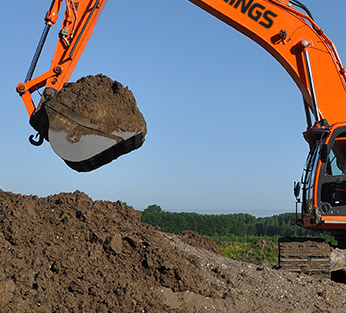
03 Jun How to keep your bulk excavation environmentally friendly
The environment is an important consideration wherever industrial works need to be carried out. Whether it’s bulk excavation or demolition, responsible firms should always put in place measures to reduce their environmental impact.
Bulk excavation is an earthworks service. It involves the removal and moving of large quantities of media from the ground by machine. It can also include the adding of media to the ground, such as sand, stone, concrete and soil.
Excavation is an essential part of the construction process. Excavation or earthworks create pens, runoff and drainage systems, sedimentation structures, holding ponds and more. Bulk excavation is also often the first stage to creating a building’s foundations – the earth has to be dug up and firm ground created for the foundations to be laid.
It isn’t typically a delicate process. Dozers are used to rough up the ground and scrapers are used to collect the dross. Depending on the makeup of the ground, the materials removed may be suitable for use within the site elsewhere. This is called moving. Moving materials around is a sound way to create consistency across a site. It’s also more environmentally-friendly than adding new materials, since the old ones would have to be driven away.
If you have a need for bulk excavation and are worried about the environmental impact of the project, here’s some tips to keep the process environmentally-friendly.
- Reuse materials
Before your project commences, a full site survey should be performed to determine the make up of the site. A survey will determine the quantity of materials in the ground, what they are and whether they can be reused. An easy material to reuse is loose soil, sand and clay. A difficult material to reuse is broken rock and boulders.
What many surveys find is inconsistencies in the make up of the site. For example, one area might be 90% soil and clay, the other 50% rock. The goal with bulk excavation is to create sites that are suitable for building on. If you have the opportunity to reuse materials, doing so will reduce your environmental impact.
- Recycle materials
If materials can’t be reused onsite you can recycle them. There are companies who take rubble and debris for free. They grind these down into a usable product for construction on other projects. It’s also important to mention general waste. Plastics and metals may be dug up onsite. These should be taken to a local recycling centre.
Whether it’s crushing sandstone or chipping wood, most ground materials can be recycled and reused in some way or another. Even plastics, which are found as waste, can be sent to a local recycling centre for use elsewhere. If you find your site unearthing loads of different materials, you will need to separate these before you recycle them.
- Have an erosion and sedimentation control plan
Erosion and sedimentation control is an important part of excavation. Adequate drainage is required to ensure run-off water doesn’t run into the surrounding environment. Water shouldn’t pond on the site. It’s also important that the site remains wet. If it dries out too much this creates dust which is carried with the wind.
The aim here is to keep eroded soil on the construction site. If you don’t control this, eroded soil can cause nearby water pollution by leaking into streams and rivers. This can damage wildlife. You can control water pollution, flooding, stream channel damage and decreased ground water storage with an erosion and sedimentation control plan.
- Operate a strict procedure for running vehicles
Construction equipment is powered by diesel. And it guzzles it. It’s common practice for workers to keep equipment running to improve site efficiency, but this has a huge effect on site air pollution. You can save money on fuel and reduce your environmental impact by only allowing workers to run equipment when needed.
Bull dozers, drag line excavators, diggers, loaders and other motorised equipment should only run when it has a job to do. If you operate a small site, have your workers walk between locations rather than drive to them. If you operate a large site, have workers jump into one vehicle and ride together to save fuel.
Bulk excavation in Leeds and Hull
Need bulk excavation in Leeds or Hull? We can help. For Leeds projects, please call us on 0113 255 8919. For Hull projects, please call us on 01482 346 650. We can assist with bulk excavation and bulk earthworks whatever the project size.


No Comments